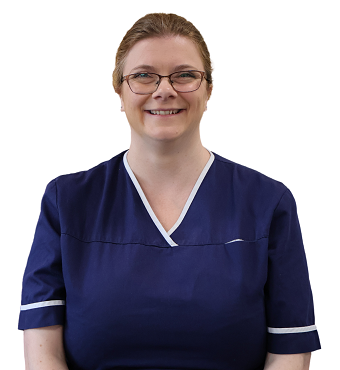
Rachel is a Nurse Educator at North Bristol NHS Trust.
She is a new researcher currently doing an internship year spending one day a week looking at end-of-life care within critical care and hopes it will lead to a pre-doctoral Award. She explains how she has been supported by the NBT R&D team to develop her research career and apply for funding.
I started off doing my masters in 2012-2013, which is where I got interested in the idea of research methodologies. Then I had almost ten years in clinical practice within ICU, which led me wonder where we could improve our clinical practise. I decided I wanted to look at end-of-life care. That was when I met Sam Harding from the research department, and she helped me think about how what I wanted to do within end-of-life care could be taken down a research health career pathway.
Day-to-day I support the career development of Band 5-7 nurses
We also induct a lot of the new starters and put them through a foundation course where we establish their basic knowledge and skills around critical care.
I received a small research grant from NBT to help get my idea off the ground
I was really excited to be the first person to receive one of the new Early Career Awards. I also received some external funding from UWE.
At the moment I'm working on my internship year
I received funding for this from the NIHR allowing me one year with one day a week looking at end-of-life care within critical care. My particular area of focus is looking at whether it's possible to provide end-of-life care at home for patients who are critically unwell. Hopefully this year will give me the skills to apply for a pre-doctoral Award scheme.
Video Transcript
I'm Rachel and I work in North Bristol ICU as a practise educator for the nursing staff.
I started off really doing my masters in 2012 to 2013, which is where I really got an interest into the idea of research methodologies.
And then I had 10 years almost in clinical practice within ICU and that very much led me down the pathway of thinking where could we improve our clinical practice?
And then I wanted to look at end of life care.
And that was when I met Sam from the research department, and she very much helped me down the way of thinking about how my what I wanted to do within end of life care could be taken down a research health career pathway.
So, at the moment I'm working on my internship year, which was I was lucky enough to receive funding from the NIHR to have one year with one day a week looking at end of life care within critical care.
So, my particular area of focus is looking at whether it's possible to provide end of life care at home for patients who are critically unwell.
I've had lots of support from the Department of Research, particularly Sam Harding and she has sort of divided up the grant schemes and the different streams of funding that are available.
And they have made it much easier for me to be able to navigate which pathway I want to go down where I need to improve my skills in order to get to that next stage as well.
So, I'm currently doing the internship to give me the skills to be able to hopefully apply for a pre-doctoral award scheme.
So, for anybody wanting to sort of start in a research career, I would strongly advocate that they speak to the research team and reach out to them.
However big, however small your project ideas might be.
It's really important that you speak to them because they have the understanding of all the different streams and the avenues that you might be able to go down to make your project come to life.
You don’t need to go down an academic route and do a PhD to work in research
There are so many other avenues within the research streams and funding that you could follow, like funded Masters or service improvement projects.
Having a PhD really isn’t the be-all and end-all when it comes to research at NBT.
I'm hopeful that my research will be of benefit to patients
From some of the PPIE groups that we've done, it seems that my research something that people want as a service. So that makes me hopeful that it will have a positive impact within clinical practice as well as within the academic arena.
I've had lots of support from R&D
For example, Sam Harding has helped by explaining the different grant schemes and streams of funding that are available. This has made it much easier for me to be able to navigate which pathway I want to go down and where I need to improve my skills to get to that next stage.
Wearing different hats has actually brought a nice balance to my career
Thinking about whether I’m wearing my practise educator hat or my baby researcher hat gives a nice variety to my week. Though it has been quite challenging at times balancing my clinical work with research. But I’ve been able to mix and match my skills throughout the year which has been really lovely.
For anybody wanting to start a research career
I would strongly advocate that they reach out to the research Grants team.
However big or small your project ideas might be, it's really important that you speak to them because they understand all the different streams and the avenues that you might be able to go down to make your project come to life.
Further information
- Careers in research and active vacancies at North Bristol NHS Trust
- Support for your research journey
- Our Current Research
